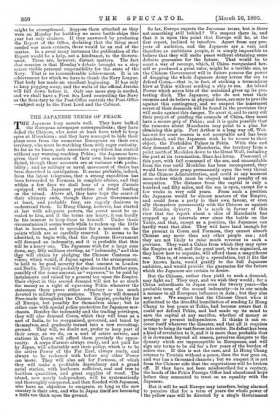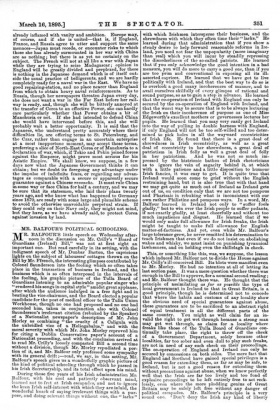THE JAPANESE TERMS OF PEACE. T HE Japanese keep secrets well.
They have baffled. the European newspaper correspondents ; they have defied the Chinese, who must at least have tried to keep spies at Hiroshima ; and they have managed to hide their plans even from the numerous Europeans on their own territory, who must be watching them with eager curiosity. So far as we know, each successive expedition has started without any warning reaching Pekin ; the Japanese have given their own accounts of their own losses uncontra- dieted, though these accounts are at variance with proba- bility; and no military or naval movement of theirs has been described in anticipation. It seems probable, indeed, from the latest telegrams, that a strong expedition has been forwarded to Formosa in complete silence, and that within a few days we shall hear of a corps d'armee equipped with Japanese perfection of detail landing on the island. Above all, they have kept the secret of their ultimate ends, though three great Governments at least, and probably four, are eagerly desirous to understand them. Li Hung Chang, however, has started at last with adequate powers, the secret must be re- vealed to him, and if the terms are heavy, it can hardly be his interest to keep them to himself. Under these circumstances it seems worth while to reckon up the little that is known, and to speculate for a moment on the points which are so carefully reserved. It seems to be admitted, to begin with, that the Japanese Government will demand an indemnity, and it is probable that this will be a heavy one. The Japanese wish for a large sum down, say, fifty millions sterling, as "indemnity," and this they will obtain by pledging the Chinese Customs re- venue, which would, if Japan agreed to the arrangement, be held to be good security for that amount in London and Berlin. They will probably also demand a further sum, possibly of the same amount, as" expenses," to be paid by instalments and raised by a general tax upon the Empire. Their object in this second demand will not be so much the money as a right of squeezing Pekin whenever the statesmen there prove either refractory or too much devoted to military preparations. Then they will demand Free-trade throughout the Chinese Empire, probably for all Europe, but possibly for themselves alone ; but in either case with special police protection for Japanese mer- chants. Besides the indemnity and the trading privileges, they will also demand Corea, which they will treat as a sort of India, to be reorganised, governed, and taxed by themselves, and gradually turned into a new recruiting- ground. They will, we doubt not, prefer to keep part of their army, as we do, on a sort of active service, and stations in Corea will afford them precisely the oppor- tunity. A corps (Farm& always ready, and not paid for by Japan, will admirably suit their policy, which is to be the active Power of the Far East, always ready, and always to be reckoned with before any other Power can move. They will also ask foi' Formosa, of which they will make a profitable dependency and a grand naval station, with harbours sufficient, coal and iron in limitless quantities, and great supplies of wood. The island, now nearly independent, will be systematically and thoroughly conquered., and then flooded with Japanese, who have no objection to emigrate, so long as the new country is their own, and who in Japan itself are becoming a little too thick upon the ground. So far, Europe expects the Japanese terms, but is there not something still behind ? We suspect there is, and that it is upon this point that Europe will be, at the first report, inclined to interfere. Apart from any pro- jects of ambition, and the Japanese are a vain and therefore an ambitious people, it is simply impossible to believe that they will make peace without obtaining some definite guarantee for the future. That would be to court a war of revenge, which, if China reorganised her- self or produced a great ruler, might be a terrible one, as the Chinese Government will in future possess the power of dragging the whole Japanese Army across the sea to defend Corea,—that is, in fact, of striking a tremendous blow at Tokio without sending a ship to sea. An island Power which seizes bits of the mainland gives up its pro- tecting ditch. The Japanese, who do not trust their enemies and do believe in physical force, are sure to provide against this contingency, and we suspect the innermost secret of their demands will be found in the provision they will make against this danger. To avert it, and to carry out their project of guiding the counsels of China, they must have a secure grip of Pekin ; and it is quite possible that the rumours about Manchuria may point to a plan for obtaining this grip. Port Arthur is a long way off, Wei- hai-wei for some reason is not acceptable and has been abandoned, and the Japanese wish to be nearer to their object, the Forbidden Palace in Pekin. With this end they demand a slice of Manchuria' the territory from a point north of Moulrden down to the Great Wall, inducting the port at its termination, Shan-hai-kwan. Possessed of this port, with full command of the sea, and unassailable from the rear until Moukden has been reconquered, they would have their grasp permanently upon the very throat of the Chinese Administration, and could at any moment issue orders which must be obeyed under penalty of an occupation. The distance from the capital is only a hundred and fifty miles, and the sea is open except for a few weeks in very cold. years. From such a position the Japanese would be almost masters of the Empire, and could form a party in their own favour, or even ally themselves permanently with the Chinese as against the Manchu dynasty. It is much in favour of this view that the report about a slice of Manchuria has cropped up at intervals ever since the battle on the Yaloo, and that, except as a position, the Japanese can hardly want that slice. They will have land enough for the present in Corea and Formosa, they cannot absorb Chinese any more than any other people can ; and they are not likely to raise much revenue in such a province. They want a Calais from which they may enter the Empire at will, and the great port, when organised, as they know how to organise, will afford them a magnificent one. This is, of course only a speculation' but it fits the few known facts, would gratify to the full Japanese ambition, and would provide the guarantee for the future which the Japanese are certain to desire.
But the Chinese rather than yield to such a demand, may fight on? They may, and we wish they would; for a China subordinate to Japan even for twenty years—the probable term of the second indemnity—is to our minds a menace to all European influence in Asia ; but they also may not. We suspect that the Chinese Court when it submitted to the dreadful humiliation of sending Li Hung Chang to beg peace at Tokio, had become aware that it could not defend Pekin, and had made up its mind to save the capital at any sacrifice, whether of money or prestige or present independence. It thinks it can re- cover itself whatever the disaster, and that all it requires is time to bring its vast forces into order. Its defeat has been a kind of revelation to it, and it is more than probable that it is downcast beyond all reason, perceives dangers to the dynasty which are imperceptible to Europeans, and will sign any terms to be rid for a few years of the burden of active war. If this is not the case, and Li Hung Chang returns to Tientsin without a peace, then the war goes on, and war has a thousand chances ; but we suspect it is not from the Chinese side that the negotiations will be broken off. If they have not been misdescribed for a century, the heads of the Pekin Foreign Office had abandoned hope before they consented to treat on an equality with the Japanese.
But it will be said Europe may interfere, being alarmed to perceive that for a term of years the whole power of the yellow race will be directed by a single Government already inflamed with vanity and ambition. Europe may, of course, and if she is united—that is, if England, France, and Russia agree to utter and support the same menaces—Japan must recede, or encounter risks to which those she has already surmounted in her war with China are as nothing ; but there is as yet no certainty on the subject. The French will not at all like a war with Japan while they are trying to seize Madagascar ; opinion in England will be greatly divided and perplexed, for there is nothing in the Japanese demand which is of itself out- side the usual practice of belligerents, and we axe hardly completely ready for a naval war in the East. We have no good repairing-station, and no place nearer than England from which to obtain heavy naval reinforcements. As to Russia, though her newspapers threaten Japan every day, she does not want a war in the Far East before her rail- way is ready, and, though she will be bitterly annoyed at the transfer of Corea to an effective Power, she can hardly care particularly whether that Power obtains a bit of Manchuria or not. If she had intended to defend China she would have intervened before this, and she will probably wait a better opportunity. It is said that the Japanese, who understand pretty accurately where their difficulties lie, are offering terms to St. Petersburg, and the Czar, rather than engage in an uncertain enterprise at a most inopportune moment, may accept those terms, preferring a slice of North-East Corea or of Manchuria to a declaration of war, which, if Tokio and Pekin joined forces against the Emperor, might prove most serious for his Asiatic Empire. We shall know, we suppose, in a few days now what the Japanese Government thinks it can obtain; but we doubt its foregoing any advantage under the impulse of indefinite fears, or regarding any advan- tages as comparable with a secure or apparently secure guarantee against a Chinese revanche. It must rule China in some way or face China for half a century, and we may be sure that its statesmen, who laid their plans twenty years ago, and who know what has happened to Germany since 1870, are ready with some large and plausible scheme to avoid the otherwise unavoidable perpetual strain. If they could rely on their Navy only, they might not mind, but they have, as we have already said, to protect Corea against invasion by land.



































 Previous page
Previous page